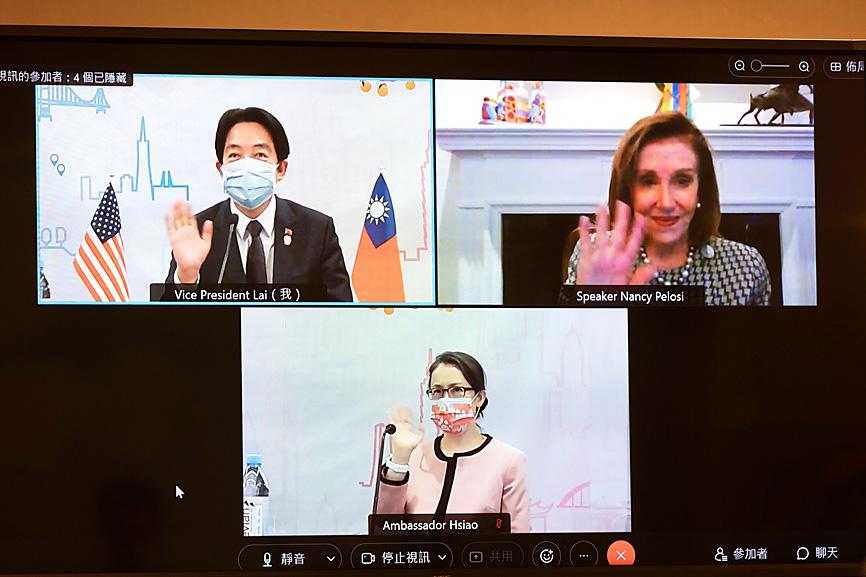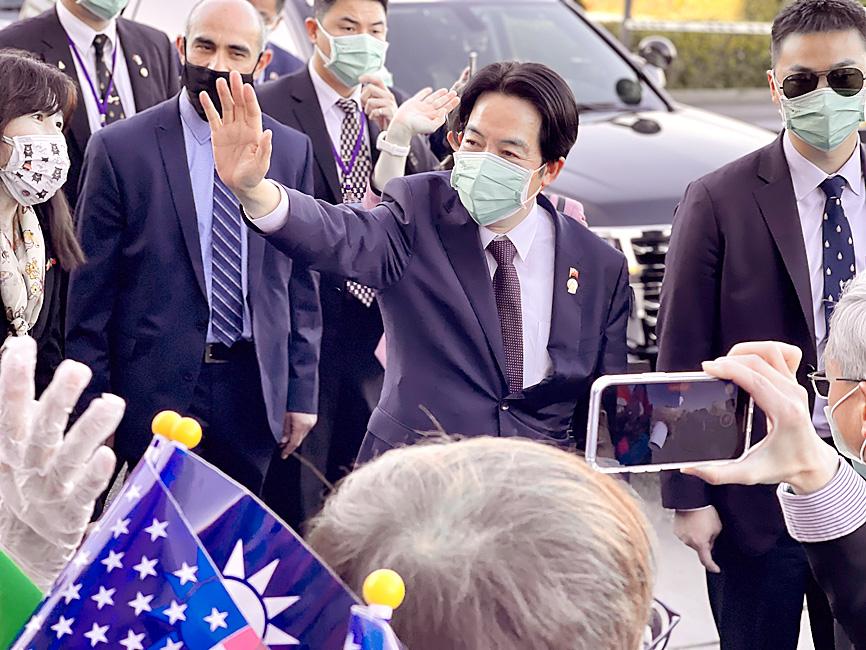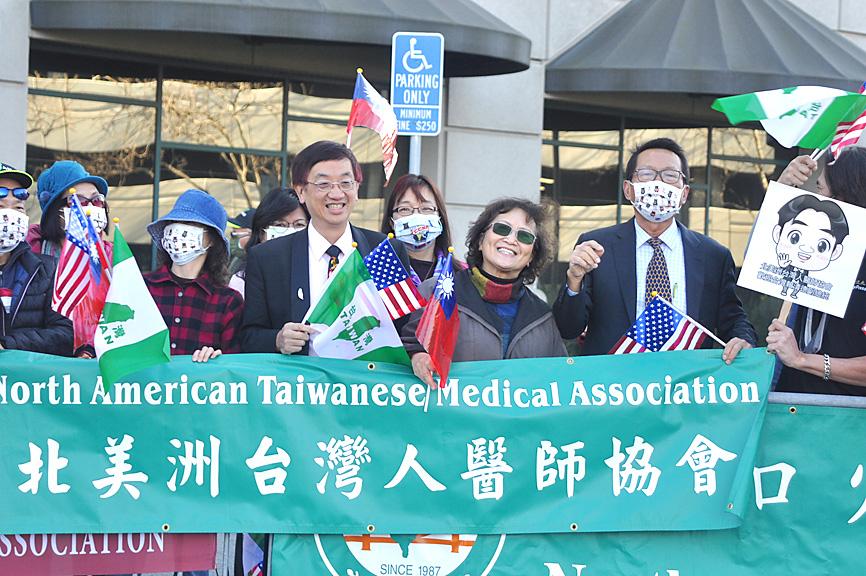Vice President William Lai (賴清德) discussed security and economic issues, as well as China, with US House of Representatives Speaker Nancy Pelosi during a virtual meeting on Friday, Representative to the US Hsiao Bi-khim (蕭美琴) said.
The meeting lasted about 30 minutes and touched on security issues, economic affairs and shared values, Hsiao told reporters after the meeting.
Pelosi expressed concern over the status and security of the Taiwan Strait, as well as human rights in China, ahead of the Beijing Winter Olympics that begins on Friday, Hsiao said.

Photo courtesy of the Presidential Office via CNA
The US has announced a diplomatic boycott of the Games, citing “genocide and crimes against humanity” in China’s Xinjiang region, which Beijing dismissed as a “self-directed political farce.”
US athletes would still attend the Games, but they would not be joined by US government officials.
Pelosi also voiced her support for Taiwan’s participation in the WHO’s activities and mechanisms, saying that she had previously conveyed her views directly to the WHO’s director-general over the matter, Hsiao said.

Photo: CNA
Pelosi recognized Taiwan’s efforts to fight COVID-19 and said the nation should not be excluded from the WHO, Hsiao said, adding that the conversation between Lai and Pelosi was “relaxed” and “amicable.”
The meeting was held shortly after Lai arrived in San Francisco for a stopover on his return trip from Honduras.
Lai later wrote on Twitter that he was pleased to meet with Pelosi, who he described as “a champion of human rights and true friend to Taiwan.”

Photo: CNA
“We are committed to working together to strengthen the US-Taiwan partnership,” Lai added.
In San Francisco, Lai was again welcomed by American Institute in Taiwan Chairman James Moriarty, before heading to the Hyatt Regency hotel, where dozens of Taiwanese expatriates greeted him.
Speaking about his trip to Honduras, Lai told a virtual meeting with representatives of the Taiwanese community that he had received a warm welcome in the Central American nation.
During his 43-hour stay in Honduras, Lai attended the inauguration ceremony of Honduran President Xiomara Castro, during which he had a brief conversation with US Vice President Kamala Harris.
He also held talks with Castro and other Honduran officials, as well as Belizean Prime Minister John Briceno.
Lai said that senior Honduran government officials, including Castro, have expressed their appreciation of the country’s ties with Taiwan and said they looked forward to improving bilateral cooperation.
The 62-year-old Honduran president had said during her presidential campaign that she would switch recognition to China if she won, although her transition team later said the new government would maintain diplomatic ties with Taiwan.
At a news conference in Tegucigalpa, Lai said the issue regarding Honduras’ ties with Taiwan had been “satisfactorily resolved.”
Lai said that Taiwan would make every effort to maintain its relations with its Central American ally and seek to work with like-minded countries, such as the US, to help improve the lives of Hondurans.
During the virtual talks with the Taiwanese community, Lai also thanked the US government for its support of Taiwan.

NATIONAL SECURITY THREAT: An official said that Guan Guan’s comments had gone beyond the threshold of free speech, as she advocated for the destruction of the ROC China-born media influencer Guan Guan’s (關關) residency permit has been revoked for repeatedly posting pro-China content that threatens national security, the National Immigration Agency said yesterday. Guan Guan has said many controversial things in her videos posted to Douyin (抖音), including “the red flag will soon be painted all over Taiwan” and “Taiwan is an inseparable part of China,” while expressing hope for expedited “reunification.” The agency received multiple reports alleging that Guan Guan had advocated for armed reunification last year. After investigating, the agency last month issued a notice requiring her to appear and account for her actions. Guan Guan appeared as required,

A Vietnamese migrant worker yesterday won NT$12 million (US$379,627) on a Lunar New Year scratch card in Kaohsiung as part of Taiwan Lottery Co’s (台灣彩券) “NT$12 Million Grand Fortune” (1200萬大吉利) game. The man was the first top-prize winner of the new game launched on Jan. 6 to mark the Lunar New Year. Three Vietnamese migrant workers visited a Taiwan Lottery shop on Xinyue Street in Kaohsiung’s Gangshan District (崗山), a store representative said. The player bought multiple tickets and, after winning nothing, held the final lottery ticket in one hand and rubbed the store’s statue of the Maitreya Buddha’s belly with the other,

‘NATO-PLUS’: ‘Our strategic partners in the Indo-Pacific are facing increasing aggression by the Chinese Communist Party,’ US Representative Rob Wittman said The US House of Representatives on Monday released its version of the Consolidated Appropriations Act, which includes US$1.15 billion to support security cooperation with Taiwan. The omnibus act, covering US$1.2 trillion of spending, allocates US$1 billion for the Taiwan Security Cooperation Initiative, as well as US$150 million for the replacement of defense articles and reimbursement of defense services provided to Taiwan. The fund allocations were based on the US National Defense Authorization Act for fiscal 2026 that was passed by the US Congress last month and authorized up to US$1 billion to the US Defense Security Cooperation Agency in support of the

CLASSIFIED BRIEFING: The ministry said the special budget focuses on building a comprehensive defense system and strengthening the domestic defense industry The Ministry of National Defense yesterday released information on seven categories of weapons systems to be procured under a stalled NT$1.25 trillion (US$39.57 billion) special defense budget, including precision artillery, long-range missiles, air defense anti-tank missiles and more than 200,000 uncrewed aerial vehicles (UAVs). The Executive Yuan approved a draft version of the budget on Nov. 27 last year and submitted it to the legislature for review. The legislature’s Foreign Affairs and National Defense Committee yesterday invited Minister of National Defense Wellington Koo (顧立雄) to deliver a classified briefing and answer questions at a closed-door session. Koo said he hoped to provide lawmakers